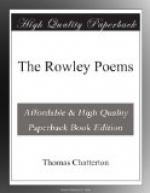We know very little about Chatterton’s life in London—but that little presents some extraordinarily vivid pictures. He lodged at first with an aunt, Mrs. Ballance, in Shoreditch, where he refused to allow his room to be swept, as he said ‘poets hated brooms.’ He objected to being called Tommy, and asked his aunt ’If she had ever heard of a poet’s being called Tommy’ (you see he was still a boy). ’But she assured him that she knew nothing about poets and only wished he would not set up for being a gentleman.’ He had the appearance of being much older than he was, (though one who knew him when he was at Colston’s Hospital described him as having light curly hair and a face round as an apple; his eyes were grey and sparkled when he was interested or moved). He was ’very much himself—an admirably expressive phrase. He had the same fits of absentmindedness which characterized him as a child. ’He would often look stedfastly in a person’s face without speaking or seeming to see the person for a quarter of an hour or more till it was quite frightful.’ We have accounts of his sitting up writing nearly the whole of the night, and his cousin was almost afraid to share a room with him ’for to be sure he was a spirit and never slept.’[11]
He wrote political letters in the style of Junius—generally signing them Decimus or Probus—that kind of vague libellous ranting which will always serve to voice the discontent of the inarticulate. He wrote essays—moral, antiquarian, or burlesque; he furbished up his old satires on the worthies of Bristol; he wrote songs and a comic opera, and was miserably paid when he was paid at all. None of his work written in these veins has any value as literature; but the skill with which this mere lad not eighteen years old gauged the taste of the town and imitated all branches of popular literature would probably have no parallel in the history of journalism should such a history ever come to be written.
His letters to his mother and sister were always gay and contained glowing accounts of his progress; but in reality he must have been miserably poor and ill-fed.
In July he changed his lodgings to the house of a Mrs. Angel, a sacque maker in Brook Street, Holborn; the dead season of August was coming on and probably he wanted to conceal his growing embarrassment from his aunt, who might have sent word of it to his mother at Bristol.
His opera was accepted—it is a spirited and well written piece—and for this he was paid five pounds, which enabled him to send a box of presents to his mother and sister bought with money he had earned. He had dreamed of this since he was eight. But his Balade of Charitie—the most finished of all the Rowley poems—was refused by the Town and Country Magazine about a month before the end; which came on August 24th. He was starving and still too proud to accept the invitations of his landlady and of a friendly chemist to take various meals with them. He was offended




